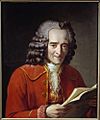Age of Enlightenment facts for kids
The Age of Enlightenment was a big cultural movement in Europe during the 18th century (the 1700s). It was very popular in France. Important thinkers, called philosophers, like Voltaire and Denis Diderot led the way. Diderot helped share these ideas by creating the Encyclopédie. This was the first large encyclopedia that many people could read. The Enlightenment built on earlier ideas from the scientific revolution and thinkers like René Descartes.
Contents
What were the main ideas of the Enlightenment?
The main idea of the Enlightenment was that everyone can reason and think for themselves. This meant people shouldn't just believe what powerful people or groups told them. They didn't have to accept everything churches or priests taught. This was a very new idea at the time.
Another important idea was that a society works best when everyone helps create it. Even people with little power or money should have the same rights as the rich. They should help decide how their society is run. The nobility (people born into powerful families) should not have special rights anymore.
These ideas were very new and sometimes dangerous for those in power. Many Enlightenment philosophers were put in prison. Some were even forced to leave their home countries.
How did the Enlightenment change the world?
Many of the Founding Fathers of the United States believed in Enlightenment ideas. For example, they thought a government's job is to help all its people, not just those in power. This idea of a government "for the people" became a key part of the new United States Constitution. It shaped the new American government they created.
Enlightenment ideas were also very important to the people who fought in the French Revolution of 1789.
In some countries, kings and queens used some Enlightenment ideas to change their governments. But they still kept most of the power for themselves. These rulers were called "enlightened despots." Examples include Catherine the Great of Russia, Frederick the Great of Prussia, and Gustav III of Sweden.
During the Age of Enlightenment, as more people used reason, some began to question traditional beliefs about how the world was created. This led to new ways of thinking.
Many important ideas we have today came from the Enlightenment. These include:
- Freedom, democracy, and reason should be the most important things in a society.
- Everyone in a society should have the same rights. Every government should have a contract (like a constitution) that promises these rights.
- People should solve problems using rationalism (logic) and the scientific method. They should not only look for answers from religion.
- Writers and philosophers should be free to search for the truth. This is true even if they disagree with powerful people.
- Nobody should be forced to follow a certain religion. There should be freedom of religion. People should accept others who follow different religions.
The Enlightenment's ideas about using reason, having personal freedoms, and questioning the Catholic Church were important. They helped create new economic systems like capitalism and socialism.
Who were the important thinkers of the Enlightenment?
Important people in the Enlightenment came from many different countries. They shared ideas in many ways. Here are some well-known Enlightenment figures, grouped by their home country:
English Thinkers
- John Locke (1632-1704): An English philosopher. He is known as the Father of Modern Empiricism (learning from experience) and the Father of Liberalism (ideas about freedom and rights). His ideas were very important to Thomas Jefferson and the Founding Fathers. They used his ideas when writing the United States Declaration of Independence. Locke's ideas about people's rights to "life, liberty, and the pursuit of happiness" were especially important. They appear in the Declaration of Independence.
- Thomas Paine (1737–1809): A writer and a radical republican. He is famous for writing a pamphlet called Common Sense. This pamphlet argued that England should not control the colonies in America. Paine also wrote The Age of Reason, which questioned the Bible. He also wrote The Rights of Man, which supported the French Revolution.
French Thinkers
- Voltaire (born François-Marie Arouet) (1694-1778): A philosopher, writer, and playwright. He often disagreed with the Catholic Church and the French government. Because of this, he was put in prison and exiled from France. He wrote many books about philosophy, plays, and history. His ideas were important in the French Revolution. Many people called the 18th century le siècle de Voltaire (the "Century of Voltaire").
- Jean-Jacques Rousseau (1712-1778): A Swiss-born French philosopher, writer, and teacher. His criticisms of the French government were very strong. In his book Emile, or On Education, he wrote many of his ideas about education.
- Baron de Montesquieu (1689-1755): A political thinker. He is famous for his writings about the separation of powers. This idea means that government power should be divided into different branches (like executive, legislative, judicial). Today, this idea is very common and is part of many constitutions worldwide.
- Denis Diderot (1713–1784): He created the Encyclopédie. This huge work included 28 different books. In these books, he wrote about all kinds of knowledge and learning.
American Thinkers
- Thomas Jefferson (1743-1826): A statesman and political philosopher. He was a Patriot who fought against England during the American Revolution. He helped write the United States Declaration of Independence (1776) and the United States Constitution (1787).
- Benjamin Franklin (1706-1790): A statesman, author, scientist, and poet. He was also a Patriot during the American Revolution. He helped write the Declaration of Independence and the Constitution. Franklin was the first person to understand lightning. He also worked as a civil servant in Philadelphia.
German Thinkers
- Immanuel Kant (1724-1804): A Prussian (German) philosopher, writer, and physicist. He was one of the most important people of the German Enlightenment. Between 1781 and 1790, Kant wrote three important books in philosophy: Critique of Pure Reason, Critique of Practical Reason, and Critique of Judgement.
- Gottfried Leibniz (1646-1716): A philosopher and mathematician who helped create calculus. He was another leader of the German Enlightenment.
- Christian Wolff (1679–1754): A philosopher who continued Leibniz's work.
Scottish Thinkers
- David Hume (1711–1776): A Scottish historian, philosopher, and economist. His ideas were important to Immanuel Kant and Adam Smith.
- Adam Smith (1723–1790): An economist and philosopher. He wrote The Wealth of Nations. In this famous book, he argued that wealth was not just money. Instead, it came from capital (money for investment) and labour (work). He is sometimes thought to have created the laissez-faire economic theory. This idea means that governments should interfere very little in the economy. His books brought many changes to the Western world.
Swedish Thinkers
- Emanuel Swedenborg (1688–1772): A natural philosopher and theologian who tried to understand how the soul worked in the body.
Images for kids
-
Reading of Voltaire's tragedy of the Orphan of China in the salon of Marie Thérèse Rodet Geoffrin in 1755, by Lemonnier, c. 1812.
-
German philosopher Immanuel Kant
-
The French philosopher Voltaire argued for religious tolerance, saying that "It does not require great art, or magnificently trained eloquence, to prove that Christians should tolerate each other. I, however, am going further: I say that we should regard all men as our brothers. What? The Turk my brother? The Chinaman my brother? The Jew? The Siam? Yes, without doubt; are we not all children of the same father and creatures of the same God?"
-
Europe at the beginning of the War of the Spanish Succession, 1700
-
One leader of the Scottish Enlightenment was Adam Smith, the father of modern economic science
-
John Trumbull's Declaration of Independence imagines the drafting committee presenting its work to the Congress
-
Statue of Cesare Beccaria, widely considered one of the greatest thinkers of the Age of Enlightenment.
-
Empress Elizabeth visits Russian scientist Mikhail Lomonosov.
-
Italian Jesuit priest Matteo Ricci worked with several Chinese elites, such as Xu Guangqi, in translating Euclid's Elements into Chinese.
-
Jean-François Champollion, considered the founder of Egyptology
-
A medal minted during the reign of Joseph II, Holy Roman Emperor, commemorating his grant of religious liberty to Jews and Protestants in Hungary—another important reform of Joseph II was the abolition of serfdom.
-
German explorer Alexander von Humboldt showed his disgust for slavery and often criticized the colonial policies—he always acted out of a deeply humanistic conviction, borne by the ideas of the Enlightenment.
-
French philosopher Pierre Bayle
-
Denis Diderot is best known as the editor of the Encyclopédie
-
Georges Buffon is best remembered for his Histoire naturelle, a 44 volume encyclopedia describing everything known about the natural world
-
First page of the Encyclopédie, published between 1751 and 1766
-
A portrait of Bernard de Fontenelle
-
Louis XIV visiting the Académie des sciences in 1671: "It is widely accepted that 'modern science' arose in the Europe of the 17th century, introducing a new understanding of the natural world"—Peter Barrett
-
Antoine Lavoisier conducting an experiment related to combustion generated by amplified sun light
See also
 In Spanish: Ilustración para niños
In Spanish: Ilustración para niños





























